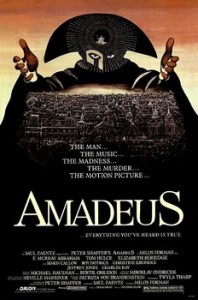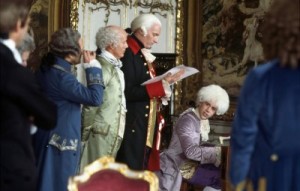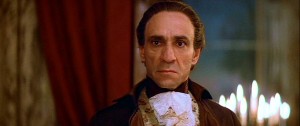by Dave Umbricht
 We live in the era of Facebook. Everyone from Lady GaGa to your grandmother has created a page, begging for your approval. Mark Zuckerberg, founder of Facebook, has been named Time’s “Person of the Year”, and now, a movie based on Facebook’s creation, The Social Network, stands as one of the favorites for the Academy Award for Best Picture. The last item should be the least surprising outcome of the rise of Facebook, as the Academy has always loved films that deal with flawed genius.
We live in the era of Facebook. Everyone from Lady GaGa to your grandmother has created a page, begging for your approval. Mark Zuckerberg, founder of Facebook, has been named Time’s “Person of the Year”, and now, a movie based on Facebook’s creation, The Social Network, stands as one of the favorites for the Academy Award for Best Picture. The last item should be the least surprising outcome of the rise of Facebook, as the Academy has always loved films that deal with flawed genius.
The Social Network follows a long tradition of films from Citizen Kane to Five Easy Pieces to A Beautiful Mind. They may not always win the Oscars, but these somewhat tragic figures offer rich characterizations. One film that did take home the awards was 1984’s Amadeus, a fascinating portrayal of the genius of Mozart and the vindictive reaction of one of his contemporaries.
Knowledge of classical music is not a prerequisite for enjoying Amadeus, as it is more than just a biopic of Mozart, but rather, a universal story of jealousy and rivalry. The story is told through the eyes of Antonio Salieri (F. Murray Abraham), a successful composer of the time. Salieri prays to God every day, pleading for more talent. He struggles with every composition he writes, and his perseverance pays off. That is, until Mozart moves to Vienna. The first time they meet, Salieri
is in the midst of presenting a new composition to the Emperor. Mozart, after only hearing it once, is able to replicate it note for note, and then proceeds to critique the piece’s simplicity and makes it more marvelously complex and beautiful. Salieri is knocked off balance by Mozart’s condescending display of genius, and it is immediately established that Salieri’s talent makes him the equivalent of a one hit wonder while Mozart is a rock god.
Both The Social Network and Amadeus deal with rivalries. The stakes of the rivalry in each says a lot about our times. In Amadeus, Salieri’s determination to destroy Mozart is driven by a feeling that God is mocking him. How dare God give talent of this level to a buffoon, when a tireless appreciative musician like Salieri toils away. It becomes a matter of life and death, as Salieri’s hatred becomes all consuming.
The audience knows Salieri truly loves Mozart’s music. In one great scene he explains the magic of a Mozart composition. In The Social Network, you never feel that anyone truly loves Facebook, not in the way Salieri loves Mozart’s music. The passion is for the money and notoriety that come from creating Facebook. There is no life and death at stake, just some money and a little bit of fame. It is no longer about the act of creativity, but solely about the spoils that come from the creation.
Acting is the key to both films. Jesse Eisenberg’s portrayal of Mark Zuckerberg is incredibly subtle. At all times he knows he could intellectually dominate every person in any room he enters. The look in his eyes shows a glint of arrogance recognizing this fact, as he sizes everyone up.
Tom Hulce’s Mozart is anything but understated, played as a rowdy rock star rather than the refined individual one would expect when hearing classical music. And while Zuckerberg is supremely aware of his genius, and believes he deserves more accolades because of it, Mozart is not, he just does we he does, and only knows that it comes easy to him.
The irony in Amadeus is that while Mozart won the historical rivalry and most people think of Tom Hulce when they think of the movie, Salieri won the Oscar. The fact that Abraham won is a testament to how great the role is, as votes are usually split when two actors are nominated for the same movie, resulting in neither taking home the prize.
Winning an acting award usually hinges on one iconic scene. There are many strong scenes for Salieri in the film, but there is one scene that stands above the rest (see below). In this scene Mozart’s wife, Constanze visits Salieri to plead for his assistance in finding work for Mozart. She brings with her a number of Mozart’s compositions, and after some coercing, allows Salieri to inspect them. He learns these are first drafts, only drafts, and there are no corrections. As he says, “They are like taking dictation.”
As he reads the music, F. Murray Abraham’s face portrays love and awe and jealousy with such subtle changes. Salieri realizes that the genius of Mozart is well beyond his imagination. After this wondrous epiphany, he knows his only choice is to destroy him.
As we grow up, there comes a point when we realize we are not as special as we think. The sign of our maturity is how we react to this fact. For most, it is not a major issue. We understand quickly that very few people actually get the chance to play in the Super Bowl. Others spend their lives in a bitter state of jealousy. Salieri had the worst sort of reaction, limiting his own creativity while attempting to destroy something he loved. In The Social Network, Mark Zuckerberg may have been the genius, but he is also part jealous Salieri.
His actions are driven by a need for acceptance from those he feels look down on him. So is Zuckerberg Mozart or Salieri? It is too soon to tell. Perhaps Facebook won’t be remembered 200 years from now, or even 20. It has the chance to live on, or like Salieri, it may be replaced by something even more genius.
Scene where Mozart’s wife visits Salieri.
Dave Umbricht loves his family, movies and the NBA (in that order). His unexplainable, genetic attraction to movies flourished in the early ’80s thanks to Siskel and Ebert. It’s also believed Dave was the only 8-year-old to know of My Dinner with Andre, even though he didn’t see it until he was 28. In the ’90s he wrote three awful screenplays, including next summer’s Cowboys and Aliens (or at least a script with the same title). He still can’t dunk a basketball.


